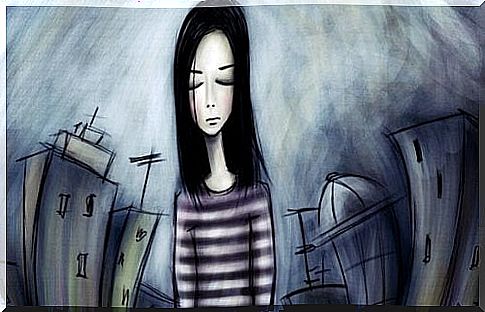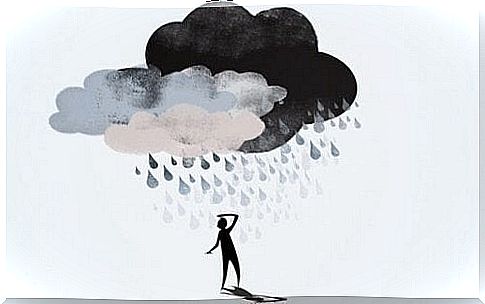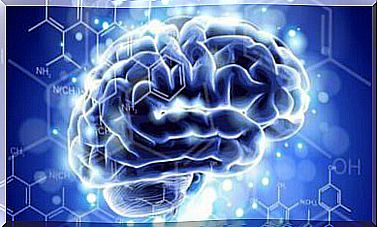Self-esteem And Depression, What Is Their Relationship?

Self-esteem and depression have a significant connection. So while the origin of depression is clearly multifactorial, clinical studies show that low self-esteem that is maintained over time makes us much more vulnerable to this type of condition. Not accepting ourselves and lacking positive feelings about ourselves leaves us without psychological resources.
Self-esteem is that set of feelings generated by the concept of self. Self-concept therefore encompasses this set of ideas and beliefs that define the mental image of who we are. Self-esteem, however, defines av ant any fundamental emotional component for human well-being.
Knowing this, we will not be surprised that psychologists and psychiatrists take into account this psychological dimension to understand the disorders of the depressive spectrum. The Diagnostic and Statistical Manual of Mental Disorders (DSM-V), however, does not include low self-esteem as such among the criteria that a person must meet to be diagnosed with depression. Dimensions such as the “feeling of worthlessness” do appear, however.
Researchers in personality psychology have always shown great interest in the relationship between self-esteem and depression. According to them, the question would be the following: is self-esteem a factor capable of promoting depression? Or is it the depression itself that ends up undermining self-esteem? Let’s see that below.

Self-esteem and depression: two models to explain their relationship
Often we get up, take a shower, have breakfast and go out without knowing that we are naked. It doesn’t matter how we are covered or the brand our clothes if we face the world with low self-esteem. Because everything passes through its thin mesh and its weak armor, abuse, fear, insecurity, negativity …
It is clear, however, that depressions generally have their diffuse and multifactorial origin, without forgetting the endogenous factors that we do not always control. We cannot ignore, however, that low self-esteem translates into low efficiency in dealing with the simplest problems. More so, the glass of glasses through which the person with low self-esteem observes the world is usually quite dark.
Scientific studies are the only way to demonstrate this link between self-esteem and depression. In particular longitudinal research. Thus, and only as a recent example, the University of Basel has published this year a very illustrative work on the subject, which can provide us with some answers. Let’s see what it is.

The vulnerability model
According to the vulnerability model, there are people with a personality profile characterized by low self-esteem. According to this point of view, this psychological model will treat life events in a negative way. He will also lack basic skills such as resilience.
- They are themselves often the promoters of a reality from which to defend themselves, to be wary of and to always position themselves as a victim or secondary actor instead of placing themselves as protagonists of their own stories. Deserving of opportunities and promoters of positive change to overcome negative events.
- The authors of this work also found that people with low self-esteem often try not to refute but rather to verify their negative self-concept by paying more attention and relevance to negative comments from people around them. .
The scar pattern
This is its opposite. According to the aforementioned longitudinal study, depression itself is often the one that shapes low self-esteem. All this legion of hopeless, negative and debilitating feelings that run through the depressed mind are the ones that directly undermine self-esteem.

Conclusion
What do we have left? Do we stick with the vulnerability model or the scar model that sees depression as a cause of low self-esteem? The American Psychological Association ( APA ) is clear on this point. She considers low self-esteem to be an additional risk factor for the development of various psychological disorders, including depression.
Even more, one of the publications of this institution warns that self-esteem and depression have such a strong correlation in cross-sectional studies that it is a priority to develop adequate prevention strategies with adolescents. The number of diagnoses continues to increase in this sector. Worse yet, the same is true of the number of suicides.
The vulnerability model is therefore the one we should all keep in mind. This in a way fits Beck’s cognitive triad model of people at higher risk for depression. Namely, profiles with a negative view of the world, people not confident in the future and seeing themselves as worthless beings.

This type of attribution, such limited and gloomy approaches, leads nowhere. They take us away from the expression of a meaningful, optimistic and hopeful life. Self-esteem and depression therefore maintain a bond of union that we cannot neglect. So let’s invest in this part of our personal universe. Maint ons the garden of our self-esteem strong, shiny, beautiful in all its aspects and crannies.










